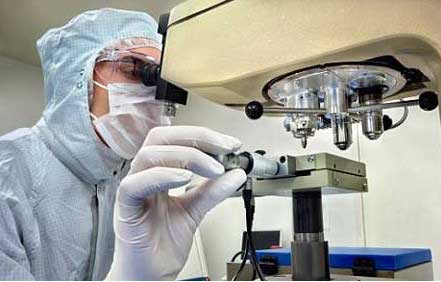 |
|
A British man may have fathered 600 children by repeatedly using his own sperm in a fertility clinic he ran, it has emerged. |
|
A British man may have fathered 600 children by repeatedly using his own sperm in a fertility clinic he ran, it has emerged. Bertold Wiesner and his wife Mary Barton founded a fertility clinic in London in the 1940s and helped women conceive 1,500 babies. It was thought that the clinic used a small number of highly intelligent friends as sperm donors but it has now emerged that around 600 of the babies were conceived using sperm from Mr Wiesner himself. Two men conceived at the clinic, Barry Stevens a film-maker from Canada and David Gollancz, a barrister in London, have researched the centre and DNA tests suggest Mr Wiesner, an Austrian biologist, provided two thirds of the donated sperm. Such a practice is outlawed now but at the time it was not known that Mr Wiesner was providing the majority of the samples. The same sperm donor should not be used to create so many children because of the risk that two of the offpsring will unwittingly meet and start a family of their own, which could cause serious genetic problems in their children. DNA tests were conducted on 18 people conceived at the clinic between 1943 and 1962. The results showed that two thirds of them were fathered by Mr Wiesner. Extrapolating this to the rest of the children conceived at the clinic it would suggest around 600 of the children were Mr Wiesner’s. Mr Gollancz told the Sunday Times: “A conservative estimate is that he would have been making 20 donations a year. “Using standard figures for the number of live births which result, including allowances for twins and miscarriages, I estimate that he is responsible for between 300 and 600 children.” In 1990 the Human Fertilisation and Embryology Act set up a regulator of fertility clinics and limits were set on the number of families a sperm or egg donor could provide. Sperm donors can provide samples for the creation of up to ten families. Around 2,000 children are born every year in Britain using donated eggs, sperm or embryos. Information about the donor is kept so the children can apply to find out the identity of their biological father and any half brothers or sisters once they turn 18. (Read by Nelly Min. Nelly Min is a journalist at the China Daily Website.) (Agencies) |
据报道,英国人威斯纳在自己开办的生育诊所中屡次使用自己的精子,他的后代数量可能达600人之多。 伯托尔德•威斯纳与妻子玛丽•巴顿20世纪40年代在伦敦开设了一家生育诊所,帮助前来就诊的女性孕育了1500名后代。 当时人们以为,有少量高智商的夫妇俩人的朋友为该诊所捐精,但现在得知,大约600名后代都是使用威斯纳自己的精子繁育的。 加拿大电影制作人巴里•史蒂文斯和律师戴维•戈兰茨都生于这家诊所,两人对这家诊所进行了调查,DNA检测结果显示,诊所的捐献精子中有2/3来自奥地利生物学家威斯纳本人。 这种做法在如今当属违法行为,但当时人们并不知道大部分精子都是威斯纳提供的。 同一名捐精者不应该有这么多后代,因为两名后代可能会无意间遇到,并且结婚生子,这可能使他们的后代面临严重的基因问题。 18名1943年至1962年出生于这家诊所的人做了DNA检测。结果显示其中2/3的人是威斯纳的孩子。 按此推论,生于这家诊所的人中大约有600人都是威斯纳的后代。 戈兰茨告诉《星期日泰晤士报》:“保守估计威斯纳一年捐精达20次。” “使用婴儿安全出生的标准数据进行计算,其中包括双胞胎和流产的情况,我估计他可能有300到600名后代。” 1990年,《人类受精与胚胎法案》对生育诊所做出规定,并限制了精子或卵子捐献者最多能为多少个家庭做出捐献。 捐精者最多为10个家庭提供精子。 英国每年有大约两千名婴儿出生于捐献的精子、卵子或者胚胎。关于捐献者的信息会被保存起来,因此当孩子18岁后,就能申请了解生父、以及他们的兄弟姐妹的身份信息。 相关阅读 (中国日报网英语点津 Julie 编辑:陈丹妮) |
|
Vocabulary: barrister: 出庭律师 unwittingly: 不知情地;无意地 extrapolate: 预测,推测 |
